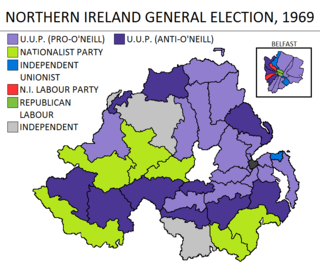A university constituency is a constituency,used in elections to a legislature,that represents the members of one or more universities rather than residents of a geographical area. These may or may not involve plural voting,in which voters are eligible to vote in or as part of this entity and their home area's geographical constituency.

The Parliament of Northern Ireland was the home rule legislature of Northern Ireland,created under the Government of Ireland Act 1920,which sat from 7 June 1921 to 30 March 1972,when it was suspended because of its inability to restore order during The Troubles,resulting in the introduction of Direct Rule. It was abolished under the Northern Ireland Constitution Act 1973.
Events from the year 1993 in Ireland.
The Ulster Liberal Party was a liberal and non-sectarian political party in Northern Ireland linked to the British Liberal Party. The party was officially neutral on the constitutional position of Northern Ireland. Members expressed different views on the issue but agreed that Northern Ireland could only join the Republic of Ireland if that was the wish of the majority of the people of Northern Ireland.

Naomi Rachel Long MLA is a Northern Irish politician who has served as Minister of Justice in the Northern Ireland Executive since February 2024,having previously served from January 2020 to October 2022. She has served as leader of the Alliance Party since 2016 and a Member of the Legislative Assembly (MLA) for Belfast East since 2020.

The 1969 Northern Ireland general election was held on Monday 24 February 1969. It was the last election to the Parliament of Northern Ireland before its abolition by the Northern Ireland Constitution Act 1973.

The 1925 Northern Ireland general election was held on 3 April 1925. It was the second election to the Parliament of Northern Ireland. It saw significant losses for the Ulster Unionist Party,although they maintained their large majority. This was the last election for the Stormont parliament conducted using Single transferable voting,a form of Proportional Representation. Fifty-two members were elected in ten districts,which each elected between four and eight members. The Ulster Unionist government abolished proportional representation during this parliament and replaced it with the first-past-the-post system used in Great Britain.

Monica Mary McWilliams is a Northern Irish academic,peace activist,human rights defender and former politician.
Events during the year 1993 in Northern Ireland.
Events during the year 1924 in Northern Ireland.

Thomas Joseph Campbell,known as T. J. Campbell,was an Irish politician,barrister,journalist,author and judge.

Queen's University of Belfast was a university constituency of the Parliament of Northern Ireland from 1921 until 1969. It returned four MPs,using proportional representation by means of the single transferable vote. In 1969 the constituency was abolished under the reforms carried out by the Prime Minister of Northern Ireland Terence O'Neill.
Albert Horatio McElroy was a minister of religion and politician in Northern Ireland.

Loreto Grammar School is a convent grammar school for girls in Omagh,County Tyrone,Northern Ireland. The teaching age range is 11–18
Elizabeth Hamill Maconachie OBE,known as Bessie Maconachie,was a unionist politician in Northern Ireland.
The Literary and Scientific Society of the Queen's University of Belfast is the university's debating society. The purposes of the Society,as per its Laws are to "encourage debating,oratory and rhetoric throughout the student body of the University and beyond".

Rosaleen "Rosie" McCorley is a former Irish Sinn Féin politician who was a Member of the Northern Ireland Assembly (MLA) for Belfast West from 2012 to 2016.
The Liberal Party of Ireland,sometimes also referred to as the Irish Liberal Party,was a minor political party in Ireland,formed in 1967 and lasting briefly until roughly 1969.









